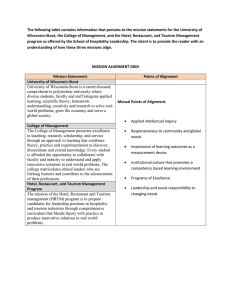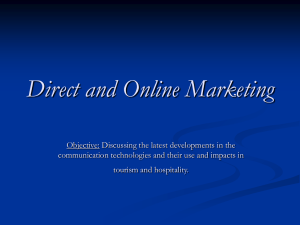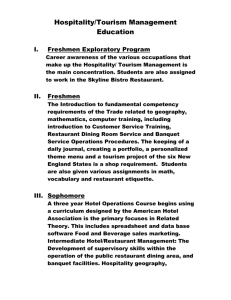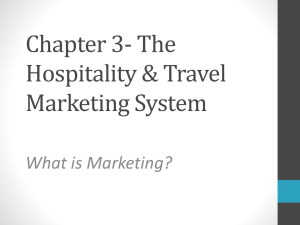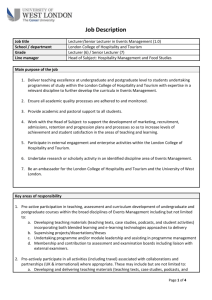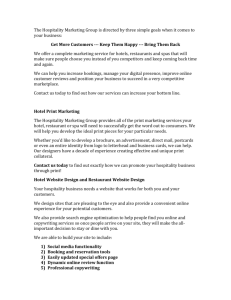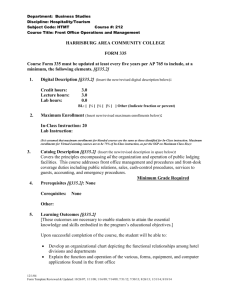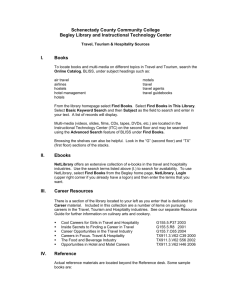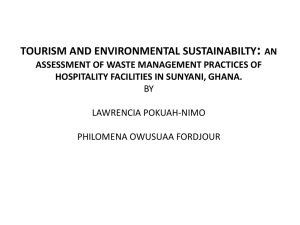THE HOSPITALITY AND TOURISM BUSINESS
advertisement
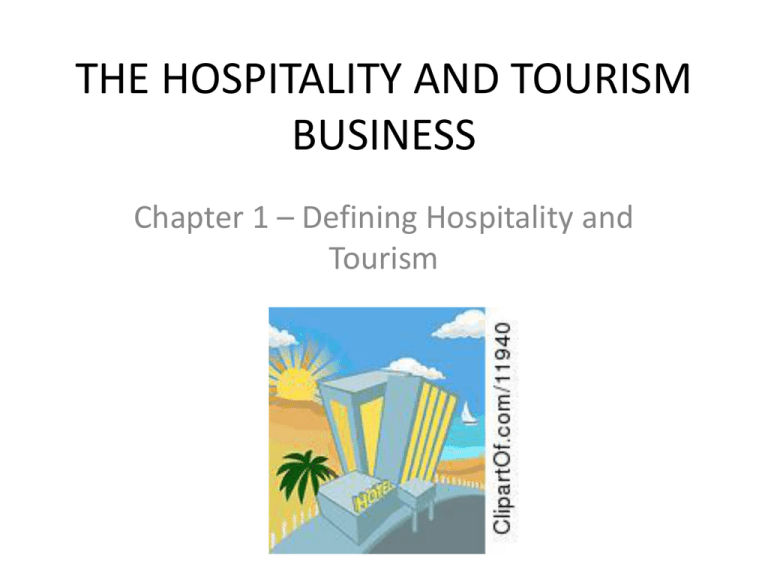
THE HOSPITALITY AND TOURISM BUSINESS Chapter 1 – Defining Hospitality and Tourism Segments of Hospitality & Tourism Lodging Food Service Travel Tourism Sports & Entertainment Events Hospitality Industry Group of businesses composed of establishments related to lodging and foodservice management. These businesses include: hotels, motels, inns, bed-and-breakfasts, small unique inns that offer a full breakfast with a night’s stay, casinos, restaurants, catering companies, hospitals, schools and many other facilities. Tourism Industry A group of businesses that encompass travel/transportation vendors for air, rail, auto, cruise and motor coach travel, and promote travel and vacations. Service Intangible thing that is a task performed for customers by a business. Variables • Factors that can cause something to change or vary. Variables always need to be considered when dealing with the service side of marketing. Perishability The probability of a produce ceasing to exist or becoming unusable within a limited amount of time. Ex. Hotel rooms Meals Intangibility Things that cannot be touched. Ex. Memories and Experiences. Changeability A condition of being subject to change or alteration. Service training for front-line personnel is essential to eliminate changeability in guest service Good or bad service determines whether customers return to any hotel or restaurant. ????Would you complain if the service was unsatisfactory in a restaurant—or you simply not return? ????Why? HOSPITALITY & TOURISM PAST AND PRESENT Signs of Hospitality The image of the pineapple is another sign of hospitality. It has a rich and romantic heritage as a symbol of welcome, friendship, and hospitality. Early explorers brought pineapples back from their expeditions to the West Indies. Grown and cultivated in Europe during the 17th century, the pineapple became the favorite fruit of royalty. A colonial sea captain, returning from travels, would display a pineapple sign at his door to give notice to friends that he had returned and was welcoming guests. Today the pineapple is the international symbol of hospitality. Restaurant Comes from the Latin word restaurare, which means to restore. The concept of a formal restaurant began in Europe in the Late 1700’s. Hospitality in the 1800’s Civilized sleeping accommodations were just beginning in the 1800’s. Pioneers such as Cesar Ritz and Conrad Hilton rushed to create the luxury accommodations that are associated with their names today. REVENUE AND EXPENSES Monthly revenue and expenses for Timber Lodge include cash sales at $9,540, charge sales at $12,450, other income at $300; salaries at $9,840, advertising at $1,500, equipment rental fees at $1,800, and supplies at $400. What is the monthly net income for the lodge? Diversity Ethnic variety as well as socioeconomic and gender variety in a group or society. ecotourism A branch of tourism encompassing adventure tourism and sustainable development of regions for future generations. Market segments Groups of consumers, categorized by specific characteristics to create a target market. TECHNOLOGY IN TRAVEL AND TOURISM Web Sites Internet Access Information Management Guest Services Airplanes—computerized security systems Cruise Ships—keyless entry; computer memory banks; photo IDs INTERNET ACTIVITY Access the Web site of the Mount Vernon Hotel Museum and answer the following questions: In what state is the Mount Vernon Hotel Museum? Who built the hotel and why did the builder(s) name it Mount Vernon? What time period does the hotel museum represent? Why would someone want to visit a historic hotel?
